mais d'abord, un petit rappel sur qui est ce Saakashvili qui a fait raser une dizaine de villages d'Ossétie du Sud, bombarder implacablement sa capitale, avant de s'offusquer dans les médias internationaux que les Russes ripostent à ce massacre de populations civiles russes. Car c'est un grand démocrate qui n'aime pas les élections.
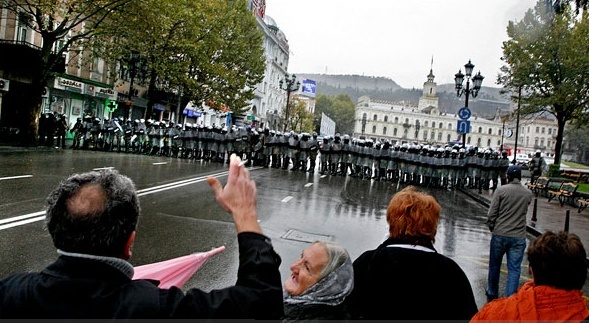
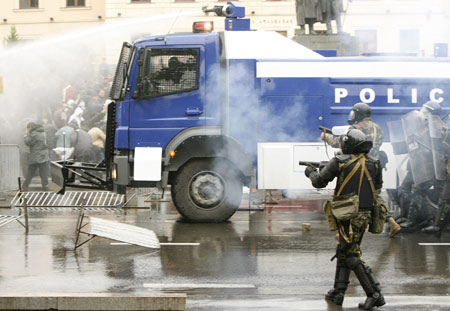
Georgia police end 5-day Tbilisi protest
November 7, 2007, 05:46 PM
http://imedinews.ge/en/news_read/76328
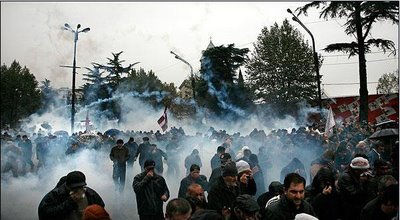
BILISI, Georgia (UPI) — Georgian police used tear gas Wednesday to break up an anti-government protest in the capital in its fifth day, Russian media reported.
A police spokesman said officers chose to move in at 8 a.m., when the number of protesters was at its lowest, the Novosti news agency reported.
Local television station showed about 150 police backed by garbage trucks converging on the throng and confiscating cameras, the report said. After four hours, the demonstration in front of the parliament building had been dispersed, Itar-Tass reported.
The demonstrators are demanding the resignation of Georgian President Mikhail Saakashvili, the restoration of elections to next April, electoral reform and the release of alleged political prisoners.
In a nationally televised address Monday, Saakashvili said he had moved the election back to next autumn as a cost-cutting measure.
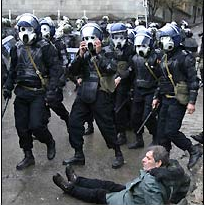

http://resistancegeorgia.blogspot.com/2007_11_01_archive.html
On November 7, riot police violently dispelled mass demonstration in Tbilisi. Hundreds of people reported injuries and poisoning by teargas. Independent TV stations were shut down. Opposition members were severely beaten and arrested. Emergency rule mandated for suspension of all media. This site is dedicated to remembrance of 07/11/07 and its victims. It aims to facilitate democratic debate in order to support peaceful resistance to establishment of author
les manifestants ont même fait la grève de la faim pour obtenir non pas des papiers parce qu'entrés illégalement dans le pays, non pas du fric et des allocs', mais simplement obtenir des élections. Une démocratie où il faut en arriver là pour qu'elle devienne démocratique, on appelle ça comment? Le digne successeur de Joseph Staline s'en fiche, les Occidentaux le soutiennent puisque Washington l'exige. Et crève son peuple..
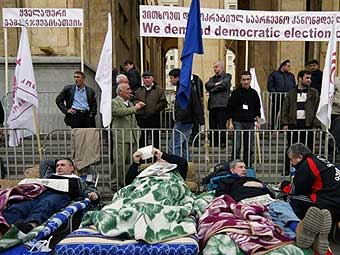
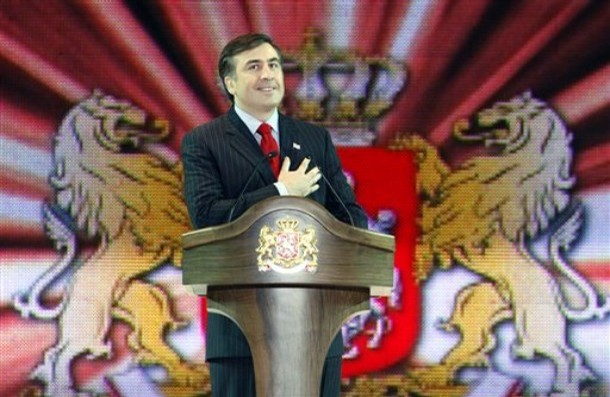
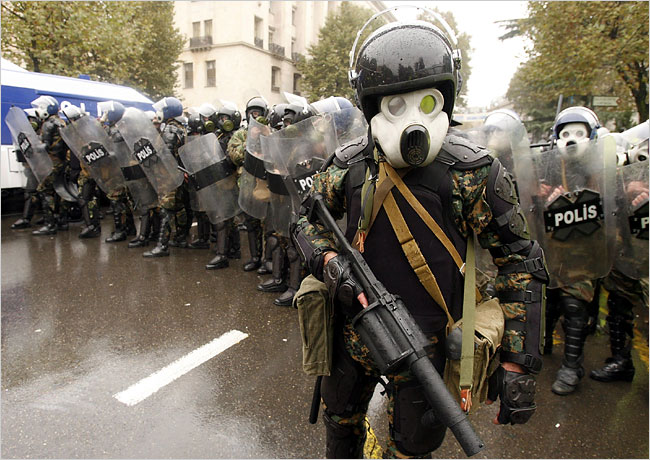
source de ces 3 photos :
http://blogs.tol.org/georgia/category/parliamentary-elections-in-georgia/
Saakashvili, ce n'est pas seulement un servile féal de Washington, mais c'est aussi un très grand démocrate, un exemple! On soutien à nouveau un frangin à Idi Amin Dada. Et on comprend surtout beaucoup mieux pourquoi il a lancé cette guerre : à l'intérieur, ce pantin de Washington est hautement impopulaire. Alors on relance la bonne vieille tactique de l'ennemi extérieur qui menace le pays. Voilà le gangster qu'une partie importante des Occidentaux soutient, et que les ex-dictateurs d'Europe orientale soutiennent aussi.
By Jenny Norton
BBC News
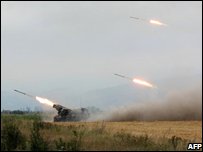
Georgia was filmed firing rockets into South Ossetia on 8 August
The fighting may well be over in South Ossetia, but the war of words between Russia and Georgia shows no sign of dying down.
Both sides blame each other for starting the violence and, as the recriminations get louder, the truth about what really happened seems in danger of being drowned out.
The succession of international leaders who have visited Georgia over the past week to offer the country support in its continuing stand-off with Russia seem reluctant to be drawn into the debate about the causes of the conflict.
"This is not the time for… allocating blame," said a spokesman for the German Chancellor Angela Merkel, who visited Tbilisi on Sunday.
But human rights groups and conflict resolution specialists argue that a full investigation into the circumstances and events of the fighting in South Ossetia are an urgent priority.
In a region where ancient feuds shape current events, half-truths from one conflict all too quickly become the myths that fuel the next cycle of violence.
So why did Russia and Georgia end up going to war?
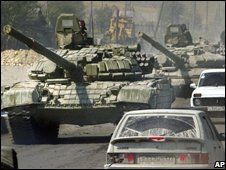
Russia sent its troops into Georgia to 'support Russian peacekeepers'
'Volunteer fighters'
The immediate causes of the fighting centre on the events of 7 August. After days of heavy exchanges of fire with South Ossetian separatist fighters, and several fruitless attempts to arrange peace talks, the Georgian side had called a unilateral ceasefire.
"We do not want to return fire," said President Mikhail Saakashvili in an early evening address on national television. "Please do not test the Georgian state's patience… Let's give peace and dialogue a chance."
But five and a half hours later, Georgia's patience snapped.
The defence ministry in Tbilisi announced that it had sent troops into South Ossetia "to restore constitutional order in the entire region".
Fierce fighting erupted around the South Ossetian capital Tskhinvali, and Georgian war planes were reported to be in action bombing the town and surrounding areas.
The Georgians said they had been forced to retaliate after coming under continuing and sustained attack from the South Ossetian side.
Prime Minister Lado Gurgenidze, speaking on the morning of 8 August, said there had also been reports of an incursion of "so-called volunteer fighters" from North Ossetia coming through the Roki tunnel, which links South Ossetia to Russia.
In a news conference six days later, the prime minister amplified this, referring to "a massive column of 150 units" crossing through the Roki tunnel during the night. It was this, he said, that had triggered the decision to send in the troops.
So far there have been no independent reports about this alleged incursion, although there were reports of Russian military exercises in the area around the Roki tunnel in the days leading up to the fighting. It is just one of many questions about this war which have yet to be answered.
Within hours Russia had launched its own "peace enforcement" operation in support, it said, of Russian peacekeepers and civilians in the region.
The first air strikes on the Georgian town of Gori were reported on the morning of 8 August, and over the following days convoys of Russian tanks and armoured vehicles were rolling through the Roki tunnel into South Ossetia and on into other parts of Georgia.
Whether or not either side was deliberately planning to go to war or just over-reacting to circumstances, it is clear that both Russia and Georgia were prepared for a sudden escalation in the violence.
Both Georgia's assault on Tskhinvali, and Russia's response to it, were swift and brutal.
Neither side seems to have given much thought to the thousands of unfortunate civilians - both Georgians and South Ossetians - who found themselves caught up in the middle of the fighting.
Human rights groups have used the word "disproportionate" to describe the actions of both sides.
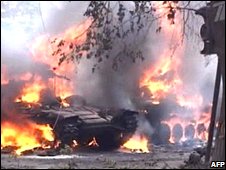
This summer's violence followed months of rising tensions
Rising tensions
Many key questions about Georgia and Russia's sudden, summer war remain unanswered.
It is still not clear how many civilians died in the bombardment of Tskhinvali or who exactly was responsible for torching dozens of Georgian homes in the conflict zone.
Nor is it clear exactly what has been going on in and around the Georgian town of Gori, where there have been reports of looting and violence by South Ossetian paramilitaries for days.
But what is clear is the failure of both diplomacy and common sense on all sides in the months leading up to fighting in South Ossetia.
This summer's violence followed months of well-documented rising tensions between Georgia and Russia.
Moscow was furious at the recognition of Kosovo in February and the promise from Nato in March that Georgia would one day become a member. The Russians hit back by upping their support for the two breakaway regions.
Russian paratroopers were sent to reinforce the peacekeepers in Abkhazia. A unit of Russian railway troops arrived to carry out repairs in the region. Throughout the spring and early summer the two sides played a seemingly endless game of provocation and retaliation.
Sporadic violence often breaks out in the summer time in Georgia's conflict zones. It is the result, local people say, of a combination of hot weather, frayed nerves and quite simply too many guns facing each other over fragile ceasefire lines.
It is a tragedy for the people of the Caucasus that this summer - despite international attempts at mediation and calls for calm - neither side seemed ready or willing to pull back from the brink.
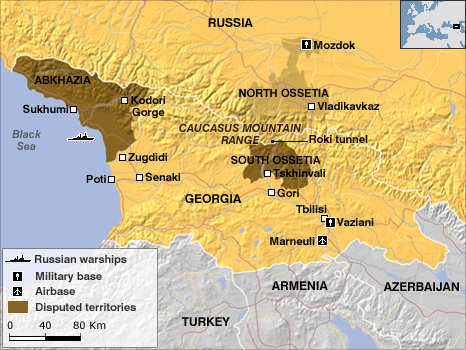
Géorgie: les Russes tardent à se retirer, sont prêts à reconnaître l'Abkhazie et l'Ossétie du Sud
http://fr.news.yahoo.com/afp/20080820/twl-georgie-russie-conflit-prev-d9fddae.html
Le territoire séparatiste géorgien d'Abkhazie a annoncé mercredi qu'il allait demander à Moscou de reconnaître son indépendance, alors que les Occidentaux continuent de presser la Russie de retirer ses troupes de Géorgie comme promis d'ici vendredi.http://fr.news.yahoo.com/afp/20080820/twl-georgie-russie-conflit-prev-d9fddae.html
"Le peuple d'Abkhazie a l'intention de demander à la direction russe de reconnaître" son indépendance, a dit à l'AFP le vice-président du parlement abkhaze Viatcheslav Tsougba.
Le parlement abkhaze doit examiner mercredi après-midi un appel en ce sens du président de la république autoproclamée, Sergueï Bagapch. Un "congrès national", rassemblement de tous les partis politiques et organisations sociales abkhazes, doit se tenir ensuite jeudi sur une place publique à Soukhoumi, la capitale abkhaze, pour l'approuver définitivement.
Le Conseil de la Fédération, chambre haute du parlement russe, a aussitôt annoncé qu'il se réunirait le lundi 25 août en session extraordinaire pour examiner cette demande, et une requête analogue concernant l'autre territoire séparatiste géorgien, l'Ossétie du Sud.
Le Conseil de la Fédération est "prêt à reconnaître" l'indépendance de l'Abkhazie et de l'Ossétie du Sud, a déclaré le président du sénat russe, Sergueï Mironov, un proche du Kremlin.
Il faut au préalable "une décision en ce sens du président de la Russie" Dmitri Medvedev, a ajouté M. Mironov, qui se trouvait à Vladikavkaz, en Ossétie du Nord (sud de la Russie) tout près de la frontière géorgienne.
Recevant au Kremlin le président abkhaze Sergueï Bagapch et son homologue ossète du sud Edouard Kokoïty, le président Medvedev avait déclaré vendredi dernier que Moscou "soutiendrait" et "garantirait" sur la scène internationale "toute décision" des séparatistes sur leur futur statut.
L'Ossétie du Sud a par le passé réclamé son rattachement, après sa séparation d'avec la Géorgie, à la Fédération de Russie. Les séparatistes abkhazes ont de leur côté évoqué un statut de territoire "associé" à la Russie.
Tbilissi a pris de haut ces nouvelles. "Qu'ils disent ce qu'ils veulent. Ce serait plutôt à la police de s'occuper de gens comme les leaders séparatistes", a commenté le ministre géorgien en charge de la "réintégration" des territoires séparatistes, Temour Iakobachvili.
Sur le terrain, un journaliste de l'AFP a vu mercredi une vingtaine de camions militaires quittant l'Ossétie du Sud en direction de la Russie, mais autant de véhicules allaient en sens inverse et aucun retrait massif ne semblait mis en oeuvre.
En visite à Tbilissi, le ministre britannique des Affaires étrangères David Miliband a accusé Moscou de "ne pas tenir sa parole", et la secrétaire d'Etat américaine, Condoleezza Rice, a jugé que la Russie devenait "de plus en plus hors-la-loi" en traînant les pieds pour retirer ses troupes, en marge d'une réunion d'urgence de l'Otan à Bruxelles.
Selon la présidence française, le président Medvedev a assuré dans un appel téléphonique mardi à son homologue Nicolas Sarkozy que "le retrait des troupes russes serait achevé les 21 et 22 août".
L'ampleur de ce retrait n'était cependant pas clairement définie, le Kremlin indiquant pour sa part avoir promis dans ces délais un retrait partiel de ses forces, déployées en territoire géorgien après une tentative le 7 août des forces géorgiennes de reprendre le contrôle de l'Ossétie du Sud.
Les autorités séparatistes ossètes ont affirmé mercredi que "l'aggression géorgienne" avait fait 1.492 morts. Alors que Moscou accusait Tbilissi d'avoir fomenté un "génocide", l'organisation Human Rights Watch (HRW) a affirmé lundi que l'attaque géorgienne avait fait des "dizaines" de tués parmi les civils plutôt que des "milliers".
L'Otan a adopté mardi à Bruxelles une déclaration commune condamnant la Russie. Une prise de position aussitôt dénoncée par Moscou, qui a souligné qu'elle aurait "des conséquences" sur ses relations avec l'Alliance.
Illustrant la nouvelle carte des soutiens de Moscou dans cette crise avec les Occidentaux, après le Vénézuélien Hugo Chavez et le Bélarusse Alexandre Loukachenko, c'est le président syrien Bachar al-Assad, attendu en Russie mercredi, qui a dénoncé dans un entretien publié à Moscou les "tentatives" des pays occidentaux d'"isoler la Russie" sur la scène internationale.
Enfin, les services secrets russes (FSB, ex-KGB) ont annoncé mercredi avoir arrêté dans le sud du pays un officier de l'armée russe d'origine géorgienne, soupçonné d'"espionnage" au profit de Tbilissi, ainsi que neuf agents géorgiens qui "espionnaient des sites militaires et préparaient des actes terroristes".
La Géorgie a noué des relations étroites avec les Etats-Unis ces dernières années, notamment dans le domaine militaire, et aspire à entrer dans l'Otan.
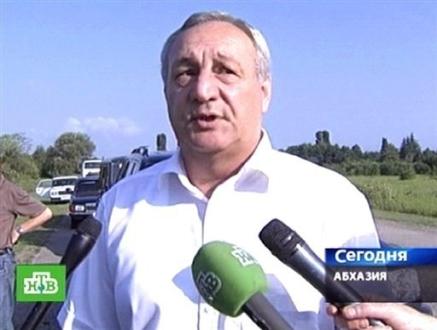 Le président de la République autonome d'Abkhazie
Le président de la République autonome d'AbkhazieAFP - Mercredi 20 août, 11h28
L'Abkhazie doit lancer un appel à la Russie demandant à celle-ci de reconnaître formellement son indépendance, qui est effective depuis 1992 mais non-reconnue internationalement.
 Le premier ministre Vladimir Poutine a déclaré que la Russie était prête à envoyer des spécialistes dans la région sécessionniste géorgienne de l'Ossétie du Sud pour y contribuer à la formation d'un gouvernement, selon des agences de presse russes. /Photo prise le 28 juillet 2008/REUTERS/RIA Novosti/Pool
Le premier ministre Vladimir Poutine a déclaré que la Russie était prête à envoyer des spécialistes dans la région sécessionniste géorgienne de l'Ossétie du Sud pour y contribuer à la formation d'un gouvernement, selon des agences de presse russes. /Photo prise le 28 juillet 2008/REUTERS/RIA Novosti/PoolTuesday, 19 August 2008 00:02 UK
video
russian tanks and armoured vehicles roll out of Gori, Georgia
Russia has dismissed a warning by Nato that normal relations are impossible while its troops remain inside Georgia.
Foreign Minister Sergei Lavrov accused Nato of bias and of trying to save the "criminal regime" in Tbilisi.
He insisted Moscow was not occupying Georgia and had no plans to annex the separatist region of South Ossetia.
Earlier, Nato demanded that Russia pull out its troops from Georgia as agreed in an EU-brokered ceasefire plan signed by both parties at the weekend.
Russian President Dmitri Medvedev told his French counterpart Nicolas Sarkozy in a phone call that the pull-out would be complete by 21-22 August, with the exception of some 500 troops, who will be installed in peacekeeping posts on either side of South Ossetia's border.
France later tabled a US-backed draft resolution at the UN Security Council, demanding full compliance with the ceasefire and calling on Moscow to withdraw its forces to the positions held before the conflict.
Russia's UN ambassador, Vitaly Churkin, rejected the text. He objected to language on Georgia's territorial integrity, saying South Ossetia and Abkhazia did not want to be part of Georgia.
Some Russian troops have been seen leaving Gori, the largest Georgian town close to the South Ossetia border.
But BBC correspondents on the ground say there are still Russian artillery positions in place. In addition, there are Russian checkpoints close to the Georgian capital, Tbilisi.
The conflict broke out on 7 August when Georgia launched an assault to wrest back control of the Moscow-backed breakaway region of South Ossetia, triggering a counter-offensive by Russian troops who advanced beyond South Ossetia into Georgia's heartland.
Both sides have accused the other of violating the peace plan, and correspondents say there has so far been little sign of any large-scale withdrawal.
Buffer zone
Following crisis talks in Brussels, Nato's 26 foreign ministers said in a joint statement that they could not have normal relations with Russia as long as Moscow had troops in Georgia.
Russia's actions for the Nato-Russia relationship," the statement said, read out by Nato Secretary General Jaap de Hoop Scheffer.
"We have determined that we cannot continue with business as usual."
Mr de Hoop Scheffer added that he could not see how the Nato-Russia Council - set up in 2002 as a framework for dialogue - could convene at this time.
But he said lines of communication would not be abandoned.
He also said that the member states had agreed to set up a Nato-Georgia commission to strengthen ties with Tbilisi, but stopped short of giving a timetable for Georgia's accession to Nato.
In a televised address, Russia's foreign minister underlined Moscow's view that Russian troops only entered South Ossetia after Georgia tried to reintegrate the breakaway region by force.
Sergei Lavrov accused Nato of being "unobjective and biased".
"It appears to me that Nato is trying to portray the aggressor as the victim, to whitewash a criminal regime and to save a failing regime," he said.
Earlier, the Russian military warned that the withdrawal would be slow until the weekend at least, and that troops would remain in an undefined buffer zone around South Ossetia.
It said such a move was permitted under the ceasefire deal which allowed Russia to take additional security measures until international peacekeepers were deployed.
But Georgia accused Moscow of going much further, saying Russian troops have seized control of a key commercial port in Poti in an attempt to cripple the Georgian economy.
In an apparent goodwill gesture Russia exchanged 15 Georgian prisoners for five of its own troops at a Russian checkpoint in Igoeti, about 30km (18 miles) from Georgia's capital.
Georgian officials told the BBC's Helen Fawkes, who was at the scene, that two of the Russian prisoners were airmen who had been shot down by Georgian forces about two weeks ago.
Meanwhile, the Organisation for Security and Co-operation in Europe (OSCE) said Russia and Georgia had agreed to allow 20 extra military observers to be deployed in and around South Ossetia.
In total, the OSCE said it would send up to 100 additional monitors to join the handful it already has in Georgia.
The OSCE has had a presence in South Ossetia since the end of a civil war there in the early 1990s, which resulted in de facto independence for the region.
It also supports a UN-led peace process in Georgia's other separatist region of Abkhazia.
comme le dit fort à propos un lecteur du forum de la BBC:
Have your say :
"The sight of GWB [US President George Bush] complaining about Russia's "disproportionate use of force" is hilarious"
Max, London
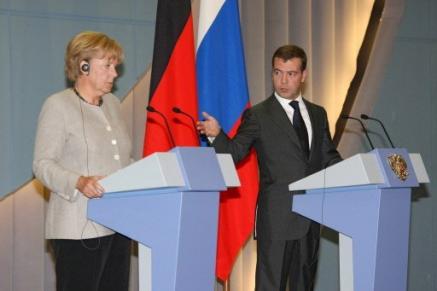 La chancelière allemande Angela Merkel a défendu l'intégrité territoriale de la Géorgie et son droit à entrer dans l'Otan, tandis que le président Dmitri Medvedev a rejeté implicitement le recours à une force internationale, à l'issue d'entretiens vendredi à Sotchi.
La chancelière allemande Angela Merkel a défendu l'intégrité territoriale de la Géorgie et son droit à entrer dans l'Otan, tandis que le président Dmitri Medvedev a rejeté implicitement le recours à une force internationale, à l'issue d'entretiens vendredi à Sotchi.AFP - Vendredi 15 août, 19h48
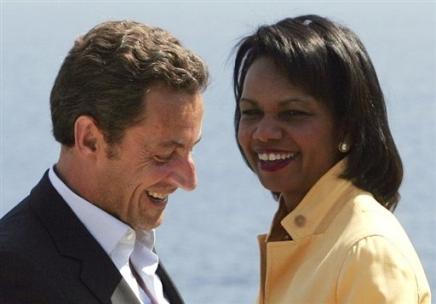 source
sourcePour sûr, le général De Gaule se retourne dans sa tombe et tambourine contre sa pierre tombale, démangé par l'envie de botter les fesses du premier d'entre les traîtres à la France, m. Nicolas Sarkozy, qui usurpe en plus le titre d'héritier du gaullisme...
Once Its Rationale, Collective Defense Poses New Challenges to a Larger NATO
Yves Logghe/Associated Press
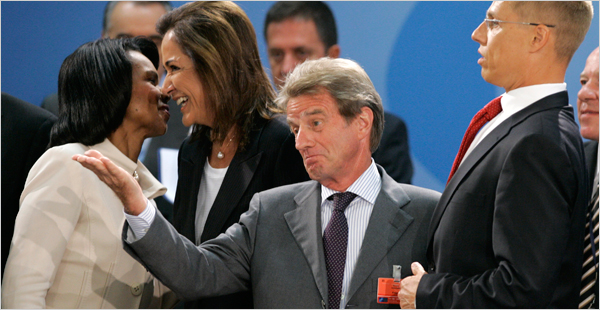 Bernard Kouchner, France’s foreign minister, center, at a NATO meeting on Tuesday attended by Secretary of State Condoleezza Rice, left, and their Greek counterpart, Dora Bakoyannis.
Bernard Kouchner, France’s foreign minister, center, at a NATO meeting on Tuesday attended by Secretary of State Condoleezza Rice, left, and their Greek counterpart, Dora Bakoyannis.By HELENE COOPER
Published: August 19, 2008
BRUSSELS — NATO foreign ministers strengthened their ties to Georgia on Tuesday and called for Russia to observe a cease-fire and withdraw its troops immediately, vowing that until it does the alliance “won’t continue with business as usual” in its relations with Moscow.
But the NATO ministers, at a rare emergency meeting, failed to agree on any specific punitive measures, despite pressure from the United States that NATO at least threaten Russia with unspecified “consequences,” and pleas from the Czech Republic, Poland and NATO’s Baltic members that it take a tough stand.
Instead, NATO issued a tepid response, promising to establish a NATO-Georgia Council to strengthen ties — a far cry from Georgia’s goal of full NATO membership. And it ignored pleas from nervous Eastern European members for a strong, “don’t even think about it” warning against military intervention there.
All of which raised a critical question: What, exactly, is membership in the nearly 60-year-old alliance worth today?
“It is worth what it has been worth since 1949,” the NATO secretary general, Jaap de Hoop Scheffer, snapped when a reporter posed the question during a news conference. “That’s my short answer.” He called it “pathetic” that Russian officials had threatened to aim ballistic missiles at a NATO member, Poland, in response to the Bush administration’s plan to locate an antimissile base there.
The trouble is, back in 1949, the alliance was formed with a central tenet of collective defense. The famous Article 5 of the NATO Charter stipulates that an attack on one NATO member is an attack on all, a principle that assured Western Europe during the cold war that America would come to its defense if Moscow encroached.
But the notion of collective defense is a more complicated matter now that NATO has expanded to include 26 countries, foreign policy experts said, including former Soviet republics like Latvia, Lithuania and Estonia, not to mention the Czech Republic and Poland. Although some said that NATO might at least try to rustle up a defense for those countries if they were attacked, the concept of collective defense falls apart completely in the case of Georgia and Ukraine — both smack in Russia’s backyard and sphere of influence — even if they were NATO members.
“If Georgia was in NATO now, would we be defending them? I don’t know,” said Charles Kupchan, a senior fellow with the Council on Foreign Relations. “The alliance needs to make sure that when it takes on pledges of collective defense, it is prepared to stand by them.”
European officials said they were not about to get into a military confrontation with Russia over Georgia. That is why European countries have blocked the Bush administration’s efforts to bring Georgia and Ukraine into the alliance, said a senior European diplomat involved in the NATO emergency meeting on Tuesday.
While the NATO statement did promise to consider the idea of beginning Georgia’s accession to NATO in December, the diplomat said that in reality, the prospects were virtually nil. “It’s impossible,” he said, speaking on the condition of anonymity under normal diplomatic procedure.
The alliance’s charter, he pointed out, stipulates that potential NATO members have to resolve outstanding border issues before joining. That alone would block Georgia’s entry. In addition, he said, European countries are not interested in granting Georgia membership just to spite Russia.
Similarly, it is doubtful that the United States, its military stretched in Iraq and Afghanistan, would go to war with Russia to defend Georgia even if it were a member of NATO, said George Friedman, chief executive of Stratfor, a geopolitical risk analysis company.
“The assumption that everybody made was that a mere guarantee by NATO would preclude any threat because the Russians would never dare displease NATO or the United States,” he said. Except now, he said, Russia has called the West’s bluff.
Tuesday’s emergency session brought the fractures in NATO into sharp relief. Even before the meeting started, the French, Germans and even the British were saying that they had no intention of seeking to isolate Russia. “We asked others not to stop relations between NATO and Russia,” Bernard Kouchner, the French foreign minister, said in an interview. “We have to talk to them, but if they don’t implement their promises, we have to react and stand up strongly.”
Still, he said: “We need firmness, not threats. We must not threaten them, because it will not work. Because everyone knows we are not going to war.”
Secretary of State Condoleezza Rice gave a long discourse about not letting Russia off the hook. “If we do, it will come back to haunt us,” Ms. Rice said, according to the official.
But that was as far as she went, he said. “Rhetorically, it was very good,” he said, “but it became clear that she does not want to start a cold war either.” He added that the Americans knew that with the exception of Poland, the Czech Republic and the Baltics, Europe was resisting even a slight increase in the pressure on Russia.
That was in sharp contrast to the nations of the “new” Europe. The Czech Republic’s foreign minister, Karel Schwarzenberg, spoke for them when he responded that Europe was already in a new cold war, and that NATO had to act, according to diplomats in the room.
But in the end, all NATO could muster was the establishment of the NATO-Georgia Council (which American officials billed as a slap in the face of Russia because it contained the words “NATO” and “Georgia” simultaneously). It also warned that until Russian troops pull out of Georgia, it would not convene another meeting of the NATO-Russia Council, which was already a pretty vague joint venture.
“We’re not abandoning the NATO-Russia Council, but as long as Russian forces are occupying a vast part of Georgia, I cannot see the NATO-Russia Council reconvening,” Mr. de Hoop Scheffer said, adding quickly, “But we certainly don’t mean to close all doors with Russia.”
One Russian official scoffed at the alliance’s response on Tuesday. Said Dmitry Rogozin, Russia’s representative to NATO: “The mountain has given birth to a mouse.”
Steven Erlanger and Tom Rachman contributed reporting from Paris, and Graham Bowley from New York.
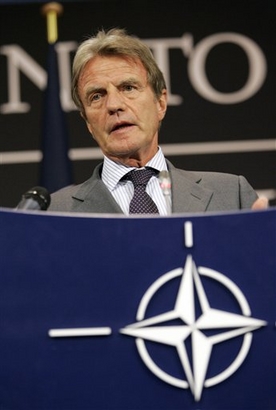 France's Foreign Minister Bernard Kouchner addresses the media at NATO Headquarters, after attending an emergency NATO foreign minister meeting in Brussels, Tuesday, Aug. 19, 2008. The NATO allies say they cannot have normal relations with Russia as long as Moscow has troops in Georgia. U.S. Secretary of State Condoleezza Rice and her 25 NATO counterparts have called on Russia to immediately withdraw its troops from Georgia. (AP Photo/Yves Logghe)
France's Foreign Minister Bernard Kouchner addresses the media at NATO Headquarters, after attending an emergency NATO foreign minister meeting in Brussels, Tuesday, Aug. 19, 2008. The NATO allies say they cannot have normal relations with Russia as long as Moscow has troops in Georgia. U.S. Secretary of State Condoleezza Rice and her 25 NATO counterparts have called on Russia to immediately withdraw its troops from Georgia. (AP Photo/Yves Logghe)Quelle honte pour la France que de se voir porteuse de valises de l'OTAN. Jamais De Gaule n'aurait accepté qu'un fidèle vassal d'Israël et de Washington n'entre au gouvernement, jamais. Sarkozy démission!
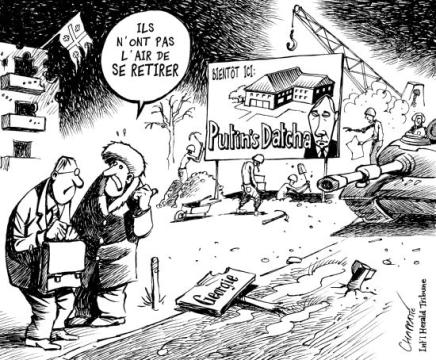 Chappatte : Les Russes prennent leurs aises
Chappatte : Les Russes prennent leurs aisesDessin paru dans le journal International Herald Tribune
source & (c) news.yahoo.fr
USA et Pologne signent l'accord sur le bouclier antimissile
http://fr.news.yahoo.com/rtrs/20080820/twl-usa-pologne-bouclier-bd5ae06.html
Par Gabriela Baczynska et David Alexander Reutershttp://fr.news.yahoo.com/rtrs/20080820/twl-usa-pologne-bouclier-bd5ae06.html
VARSOVIE (Reuters) 20/8/2008 - Les Etats-Unis et la Pologne ont signé à Varsovie un accord sur le déploiement en territoire polonais d'éléments du bouclier antimissile américain, à l'origine de tensions avec la Russie ravivées par le récent conflit dans le Caucase.
En échange, Washington s'est engagé à renforcer et à moderniser la défense aérienne polonaise.
L'accord, qui doit encore être ratifié par le parlement de Varsovie, a été signé par la secrétaire américaine d'Etat Condoleezza Rice et son homologue polonais Radoslaw Sikorski au cours d'une cérémonie à laquelle assistaient également le Premier ministre polonais Donald Tusk et le président Lech Kaczynski.
Moscou considère le projet de bouclier américain comme une menace contre sa sécurité et a accusé Varsovie et Washington d'avoir accéléré la signature de l'accord en réponse à son intervention militaire en Géorgie.
Une base du nord de la Pologne doit accueillir d'ici 2011 ou 2013 dix missiles intercepteurs dans le cadre de ce projet destiné selon Washington à répondre aux menaces posées par les "Etats voyous" comme l'Iran ou les groupes terroristes comme Al Qaïda. Les travaux commenceront l'an prochain.
Les dix missiles d'une portée de 3.000 km seront déployés dans des silos souterrains, sur une surface équivalente à celle d'un terrain de football. Ils ne seront pas équipés de charge explosive mais seront tirés en direction de tout missile adverse, avec lequel ils entreront en collision à une vitesse de 24.000 km/h.
TROIS MILLIARDS ET DEMI DE DOLLARS
La République tchèque, elle, doit accueillir une station radar géante. L'accord doit lui aussi être ratifié par le parlement de Prague.
Le projet représente au total 3,5 milliards de dollars.
"Cet accord va établir un site de missiles de défense en Pologne, qui nous aidera à affronter les nouvelles menaces du XXIe siècle, celles des missiles à longue portée (...) venant de pays comme l'Iran ou la Corée du Nord", a déclaré Rice aux journalistes.
Les Etats-Unis disposent déjà de missiles intercepteurs en Alaska et en Californie, un système de défense que le bouclier installé en Europe centrale viendra compléter.
Mais pour le Kremlin, cet accord vise en fait la Russie et ne fait qu'aggraver les relations entre Washington et Moscou.
Les Russes jugent que la mise en place de ce bouclier modifie l'équilibre des forces en Europe.
Le général Anatoli Nogovitsine, numéro deux de l'état-major interarmes russe, a déclaré vendredi dernier que la doctrine militaire de son pays rendait théoriquement possible une attaque nucléaire après l'acceptation par Varsovie du déploiement de ces intercepteurs sur son territoire.
Pour Washington, ces menaces ne sont que des "mots creux" mais l'Otan les a jugées mardi "inacceptables".
Selon un sondage effectué le 16 août par GFK Pologne pour le quotidien Rzeczpospolita, le soutien des Polonais au bouclier antimissile s'est nettement accru après l'intervention russe en Géorgie.
Environ 50% des Polonais soutiennent désormais ce projet, et 37% y sont hostiles. Les précédentes études indiquaient qu'une majorité de Polonais étaient opposés au bouclier américain.
Conscients de l'hostilité du Kremlin à ce projet, 77% des Polonais pensent que l'accord signé avec les Etats-Unis détériorera les relations entre Varsovie et Moscou.
Version française Henri-Pierre André et Guy Kerivel
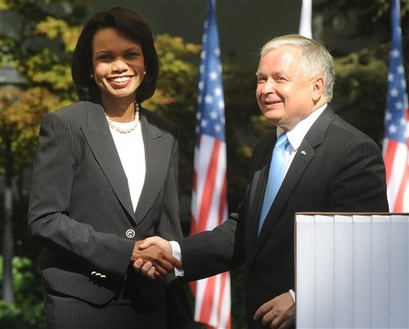 U.S. Secretary of State Condoleezza Rice, left, and Polish President Lech Kaczynski shake hands after a meeting in Warsaw, Poland, Wednesday, Aug. 20, 2008. Rice came to Warsaw to sign a deal with Poland that will see a U.S. missile defense base built in northern Poland. (AP Photo/Alik Keplicz)
U.S. Secretary of State Condoleezza Rice, left, and Polish President Lech Kaczynski shake hands after a meeting in Warsaw, Poland, Wednesday, Aug. 20, 2008. Rice came to Warsaw to sign a deal with Poland that will see a U.S. missile defense base built in northern Poland. (AP Photo/Alik Keplicz)Rice signs missile defense deal with Poland
http://news.yahoo.com/s/ap/20080820/ap_on_re_eu/poland_us_missile_defense
By VANESSA GERA and MONIKA SCISLOWSKA, Associated Press Writershttp://news.yahoo.com/s/ap/20080820/ap_on_re_eu/poland_us_missile_defense
WARSAW, Poland - Secretary of State Condoleezza Rice and her Polish counterpart signed a deal Wednesday to build a U.S. missile defense base in Poland, an agreement that prompted an infuriated Russia to warn of a possible attack against the former Soviet satellite.
The deal to install 10 U.S. interceptor missiles just 115 miles from Russia's westernmost frontier also has strained relations between Moscow and the West, ties that already troubled by Russia's invasion of its former Soviet neighbor, U.S. ally Georgia, earlier this month.
Rice and Polish Foreign Minister Radek Sikorski signed the deal Wednesday morning.
"It is an agreement which will help us to respond to the threats of the 21st century," she said afterward.
Polish Prime Minister Donald Tusk said the agreement came after tough but friendly negotiations.
"We have achieved our main goals, which means that our country and the United States will be more secure," he said.
After Warsaw and Washington announced the agreement on the deal last week, top Russian Gen. Anatoly Nogovitsyn warned that Poland is risking attack, and possibly a nuclear one, by deploying the American missile defense system, Russia's Interfax news agency reported.
Poles have been shaken by the threats, but NATO Secretary General Jaap de Hoop dismissed them Tuesday as "pathetic rhetoric."
"It is unhelpful and it leads nowhere," he told reporters at a NATO meeting in Brussels, Belgium.
Many Poles consider the agreement a form of protection at a time when Russia's invasion of Georgia has generated alarm throughout Eastern Europe. Poland is a member of the European Union and NATO, and the deal is expected to deepen its military partnership with Washington.
Polish President Lech Kaczynski also expressed "great satisfaction" at the outcome of the long months of negotiations.
Poland and the United States spent a year and a half negotiating, and talks recently had snagged on Poland's demands that the U.S. bolster Polish security with Patriot missiles in exchange for hosting the missile defense base.
Washington agreed to do so last week, as Poland invoked the Georgia conflict to strengthen its case.
The Patriots are meant to protect Poland from short-range missiles from neighbors — such as Russia.
The U.S. already has reached an agreement with the government in Prague to place the second component of the missile defense shield — a radar tracking system — in the Czech Republic, Poland's southwestern neighbor and another formerly communist country.
Approval is still needed the Czech and Polish parliaments.
No date has been set for the Polish parliament to consider the agreement, but it should face no difficulties in Warsaw, where it enjoys the support of the largest opposition party as well as the government.
le plus débile dans cette provocation gratuite et volonté de faire escalader vers un conflit majeur, c'est que les dirigeants corrompus de Varsovie doivent vraiment jouer aux plus cons de la planète pour ignorer le peu de réussite des missiles anti-missiles américains! En 1991, pendant que les forces alliées dégommaient fort justement les Irakiens qui étaient au Koweit (célèbre dictature esclavagiste mais ça ne justifie pas son annexion par Bagdad), ces derniers ont tiré un seul et unique missile sur une base militaire américaine installée en Arabie Séoudite. C'était un bête Scud, une version à peine plus évoluée des V2 allemands de 1944, et les missiles intercepteurs américains l'ont manqué, et il y a eu près de 30 morts. Je serais citoyen Polonais, j'irais déverser dans la boîte aux lettres du président tout le fumier que je trouverais à la campagne, pour le remercier pour la merde dans laquelle il place la Pologne rien que pour satisfaire son chef américain.
Petit rappel chiffré par un forum américain sur les "succès" de ce matériel américain.
The US missile defence system is the magic pudding that will never run out
http://eastern-european-forum.blogspot.com/2008/08/us-missile-defence-system-is-magic.html
Wednesday, August 20, 2008
It's a novel way to take your own life. Just as Russia demonstrates what happens to former minions that annoy it, Poland agrees to host a US missile defence base. The Russians, as Poland expected, respond to this proposal by offering to turn the country into a parking lot. This proves that the missile defence system is necessary after all: it will stop the missiles Russia will now aim at Poland, the Czech Republic and the UK in response to, er, their involvement in the missile defence system.
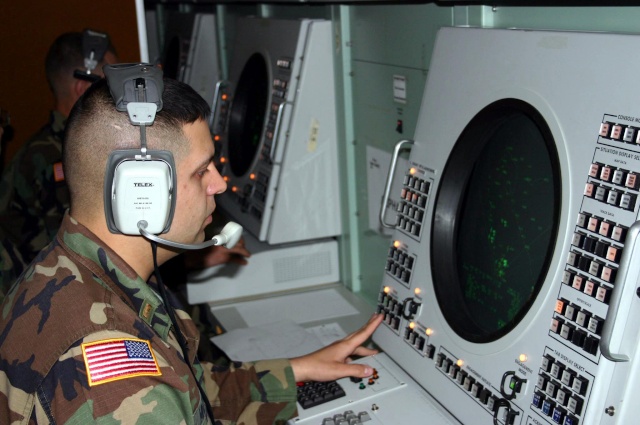

The American government insists that the interceptors, which will be stationed on the Baltic coast, have nothing to do with Russia: their purpose is to defend Europe and the US against the intercontinental ballistic missiles Iran and North Korea don't possess. This is why they are being placed in Poland, which, as every geography student in Texas knows, shares a border with both rogue states.
They permit us to look forward to a glowing future, in which missile defence, according to the Pentagon, will "protect our homeland ... and our friends and allies from ballistic missile attack"; as long as the Russians wait until it's working before they nuke us. The good news is that, at the present rate of progress, reliable missile defence is only 50 years away. The bad news is that it has been 50 years away for the past six decades.
The system has been in development since 1946, and so far it has achieved a grand total of nothing. You wouldn't know it if you read the press releases published by the Pentagon's missile defence agency: the word "success" features more often than any other noun. It is true that the programme has managed to hit two out of the five missiles fired over the past five years during tests of its main component, the ground-based midcourse missile defence (GMD) system. But, sadly, these tests bear no relation to anything resembling a real nuclear strike.
Posted by untermensch
Moscou bloque un projet de résolution de l'Onu sur la Géorgie
http://fr.news.yahoo.com/rtrs/20080820/tts-russie-georgie-onu-ca02f96.html
Par Patrick Worsnip Reuters - Mercredi 20 août, 07h56http://fr.news.yahoo.com/rtrs/20080820/tts-russie-georgie-onu-ca02f96.html
NATIONS UNIES (Reuters) - Les puissances occidentales ont présenté au Conseil de sécurité des Nations unies un projet de résolution réclamant le retrait immédiat des forces russes de Géorgie, mais Moscou, qui détient un droit de veto, a dit ne pas pouvoir soutenir ce texte.
Le représentant permanent de la Russie à l'Onu, Vitali Tchourkine, a déclaré que la résolution devait comprendre et avaliser le plan de paix en six points promu par le président Nicolas Sarkozy et signé par la Géorgie et la Russie.
Etant donné que le projet de résolution, élaboré par la France, ne va pas dans ce sens, "la Fédération de Russie ne sera pas en mesure de le soutenir", a-t-il dit.
La réunion du Conseil de sécurité a pris fin sans que le texte soit soumis à un vote et les responsables occidentaux n'ont pas dit si un vote était envisagé ultérieurement, ce qui entraînerait très probablement un veto russe.
Le projet de résolution exige le retrait immédiat des troupes russes sur leurs positions antérieures au début du conflit le 7 août, le retour des troupes géorgiennes dans leurs cantonnements habituels et le respect immédiat et total de l'accord signé la semaine dernière.
Il fait référence au respect "de l'intégrité territoriale de la Géorgie dans ses frontières internationalement reconnues", un concept jugé dépassé par la Russie parce que les deux enclaves sécessionnistes soutenues par Moscou refusent de réintégrer le giron géorgien.
Alejandro Wolff, représentant permanent adjoint des Etats-Unis, a déclaré que l'Ossétie du Sud et l'Abkhazie, l'autre région sécessionniste, faisaient incontestablement partie de la Géorgie.
"REVIREMENT FRANÇAIS"
Le texte remplace une version plus longue en discussion depuis quelques jours avec la Russie, qui aurait intégré le plan en six points mis au point la semaine dernière par la France en sa qualité de présidente de l'Union européenne, et approuvé par Moscou et Tbilissi.
Des diplomates américains et français ont expliqué qu'ils avaient opté pour une version beaucoup plus courte parce que la Russie n'a pas appliqué le plan de paix qu'elle avait signé.
"L'important ici, c'est l'application des engagements signés par la Russie", a dit Wolff à des journalistes. "Cela fait plusieurs jours que l'accord a été signé et nous n'avons relevé aucun signe de retrait russe significatif", a-t-il noté.
Le numéro deux de la mission française à l'Onu, Jean-Pierre Lacroix, a déclaré de son côté que son pays voulait poursuivre le plan de paix, "mais pour que ce plan soit appliqué, il y a un prérequis essentiel qui est le retrait des forces russes", a-t-il dit.
Mais Tchourkine a déclaré à des journalistes qu'il était "très étonné" par le revirement français, ajoutant que l'appel à un retrait immédiat des forces russes ne figurait pas dans les six principes.
Des chars et des véhicules blindés russes ont quitté mardi la ville géorgienne de Gori, mais l'Otan a fait savoir qu'elle gelait ses contacts avec Moscou jusqu'au retrait de toutes les forces russes de Géorgie.
Le Kremlin a fait savoir mardi, en citant le président Dmitri Medvedev, que les forces russes se seraient repliées d'ici le 22 août sur les positions définies dans le cadre de l'accord de cessez-le-feu.
Cela impliquerait que la plupart d'entre elles se retirent en Russie ou en Ossétie du Sud bien que, dans le cadre de l'accord, une partie resterait dans une zone tampon autour de la région sécessionniste.
Tchourkine a déclaré que, pour que les troupes russes se retirent, "deux choses sont nécessaires. La première est le retour des forces russes dans leurs casernes (...) Cela ne s'est pas encore produit (...) et deuxièmement, nous devons avoir l'assurance que nos soldats de la paix ne seront pas à nouveau
Guy Faulconbridge à Moscou et Patrick Worsnip à New York, version française Eric Faye, Guy Kerivel et Nicole Dupont
 Russian servicemen sit on a tank in Gori near South Ossetia, August 15, 2008.U.S. Secretary of State Condoleezza Rice on Friday called for the immediate withdrawal of Russian forces. (Gleb Garanich/Reuters)
Russian servicemen sit on a tank in Gori near South Ossetia, August 15, 2008.U.S. Secretary of State Condoleezza Rice on Friday called for the immediate withdrawal of Russian forces. (Gleb Garanich/Reuters)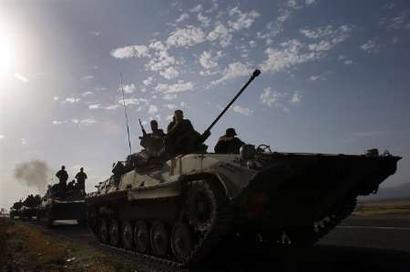
Autre coûteuse leçon de cette invasion de l'Ossétie par les Géorgiens : les Russes savent à présent ce que valent les armes US conventionnelles quand elles leurs sont opposées par des soldats directement formés et encadrés par les USA.
Et comme ils connaissent l'état des pertes US en Irak et Afghanistan, l'état des réserves en personnel qu'ont encore les Américains (pas grand chose, la Garde Nationale US ayant été anti-constitutionnellement détournée de ses buts et déployée hors du pays pour faire face au manque de relève militaire US!), ils savent ce que valent les rodomontades de Condy Rice et GW Bush. Le peu de pertes russes dans cette riposte-éclair rend le président Medveved et son premier ministre Poutine crédibles auprès des Russes. Qui pourrait en dire autant de Bush & co? En quoi la stabilité du monde aurait-elle encore gagné des points avec cette nouvelle folie US?
--------------------------------
Why Not Simply Abolish NATO?
http://eastern-european-forum.blogspot.com/2008/08/why-not-simply-abolish-nato-north.html

The North Atlantic Treaty Organization (NATO) is a relic of the Cold War. It was created on April 4, 1949 as a defensive alliance of Western Europe countries plus Canada and the United States to protect the former countries from encroachments by the Soviet Union.
But since 1991, the Soviet empire no longer exists and Russia has been cooperating economically with Western European countries, supplying them with gas and oil, and all types of commodities. This has increased European economic interdependence and thus greatly reduced the need for such a defensive military alliance above and beyond European countries' own self-defense military system.
But the U.S. government does not see things that way. It would prefer keeping its role as Europe's patronizing protector and as the world's sole superpower. NATO is a convenient tool to that effect. But maybe the world should be worried about those who go around the planet with a can of gasoline in one hand and a box of matches in the other, pretending to sell fire insurance.
Posted by untermensch
bonne réflexion, n'est-ce pas?
-----------------------
ICC prosecutor says analysing situation in Georgia
http://www.alertnet.org/thenews/newsdesk/LK558005.htm
20 Aug 2008 12:50:31 GMThttp://www.alertnet.org/thenews/newsdesk/LK558005.htm
Source: Reuters
AMSTERDAM, Aug 20 (Reuters) - The Hague-based International Criminal Court is conducting an analysis of Georgia over potential war crimes, its chief prosecutor said on Wednesday.
Chief Prosecutor Luis Moreno-Ocampo, who indicated last week that the court may launch a preliminary investigation into the conflict in Georgia's breakaway province of South Ossetia, said in a statement that his office had been "closely monitoring all information on the situation" including reports on attacks on civilians.
"My office considers carefully all information relating to alleged crimes within its jurisdiction -- war crimes, crimes against humanity and genocide -- committed on the territory of States Parties or by nationals of States Parties," Ocampo said, noting that Georgia is a signatory to the treaty that created the ICC.
An investigation by ICC prosecutors is the first formal step toward potential war crimes charges, but the ICC made clear in its statement that it was stopping short of an investigation and only conducting an analysis, both from meetings with officials and public sources.
Fighting in South Ossetia erupted earlier this month when Georgia sent its forces to retake control of the pro-Russian province that rejected Georgian rule in the 1990s.
Moscow responded by sending in heavily armed troops, who quickly overwhelmed the Georgian soldiers.
Separately, Georgia said last week it had filed a lawsuit against Russia at the International Court of Justice (ICJ), also based in The Hague, for ethnic cleansing.
The ICJ, also known as the World Court, rules on disputes between nations while the ICC was set up to try individuals for serious crimes such as genocide, crimes against humanity and war crimes. (Reporting by Reed Stevenson; editing by Mike Collett-White)
Ahh, le tribunal pénal international de La Haye... On se souviendra qu'il n'y a pas si longtemps que ça, ce tribunal "indépendant" a libéré un criminel de guerre avéré, devenu ministre d'un état fantoche, un territoire arraché par les USA à un pays souverain, la province serbe du Kosovo.
Ce même tribunal n'a cessé de faire preuve de partialité dans toutes les affaires dont il a été saisi, ne retenant jamais que le point de vue de Washington, quelles que soient les preuves à charge ou à décharge.
A présent, le gangster installé au pouvoir à Tbilisi sait qu'il a cette carte-là à jouer pour ennuyer Moscou : c'est Washington qui mélange et distribue les cartes, et elles sont pipées.
Géorgie: Moscou accuse Tbilissi d'aggressivité, le retrait russe tarde encore
http://fr.news.yahoo.com/afp/20080820/twl-georgie-russie-conflit-prev-d9fddae.html
MOSCOU (AFP) - Moscou, dont le retrait de Géorgie tarde toujours, a accusé mercredi Tbilissi de préparer une nouvelle attaque contre les séparatistes d'Ossétie du Sud, alors que la région rebelle d'Abkhazie veut demander à Moscou de reconnaître son indépendance.http://fr.news.yahoo.com/afp/20080820/twl-georgie-russie-conflit-prev-d9fddae.html
"La partie géorgienne continue de prendre des mesures de redéploiement et de rétablissement de la capacité de combat de ses forces", aux abords de la région séparatiste d'Ossétie du Sud, a déclaré le chef-adjoint d'état major de l'armée russe Anatoli Nogovitsyne à Moscou.
Il a jugé que Tbilissi n'avait "pas l'intention de renoncer à ses intentions agressives".
Le général a par ailleurs indiqué que les troupes russes allaient fortifier la zone tampon située hors de l'Ossétie du Sud. La ville géorgienne de Gori, dont l'accès était toujours barré par les Russes, ne fait pas partie de cette zone où les forces de maintien de la paix russes sont autorisées de par leur mandat à entrer en cas de conflit, a-t-il admis.
Le ministère géorgien de l'Intérieur a de son côté jugé qu'"il n'y avait aucun mouvement ou signe important d'un retrait".
Pourtant la présidence française a indiqué mardi soir que le président russe Dmitri Medvedev avait assuré dans un appel téléphonique à son homologue Nicolas Sarkozy que le retrait "serait achevé les 21 et 22 août".
Un journaliste de l'AFP a constaté que Gori était toujours contrôlé par les forces russes qui allaient et venaient en nombre sur la route reliant cette ville stratégique proche de l'Ossétie du Sud à la capitale géorgienne Tbilissi.
Un autre correspondant de l'AFP a vu mercredi une vingtaine de camions militaires quittant l'Ossétie du Sud vers la Russie, mais autant de véhicules allaient en sens inverse.
L'autre territoire séparatiste pro-russe en Géorgie, l'Abkhazie a annoncé qu'elle demanderait à Moscou de reconnaître son indépendance.
"Le peuple d'Abkhazie a l'intention de demander à la direction russe de reconnaître" son indépendance, a dit le vice-président du Parlement abkhaze Viatcheslav Tsougba.
L'assemblée doit se réunir à ce sujet mercredi après-midi. Un "congrès national", rassemblant partis politiques et organisations sociales, doit se tenir ensuite jeudi sur une place publique à Soukhoumi, la capitale abkhaze, pour approuver sa demande à la Russie.
Le Conseil de la Fédération, chambre haute du Parlement russe, a aussitôt annoncé qu'il se réunirait le 25 août pour examiner cette question, ainsi qu'une requête analogue concernant l'Ossétie du Sud.
Le président de la chambre, Sergueï Mironov, a indiqué que ses collègues étaient "prêts à reconnaître" les indépendances abkhaze et sud-ossète, tout en conditionnant ce geste à une décision du président russe. Ce dernier avait promis la semaine dernière de soutenir "toute décision" des séparatistes.
Tbilissi a pris de haut ces nouvelles: "Ce serait plutôt à la police de s'occuper de gens comme les leaders séparatistes", a commenté le ministre géorgien chargé de la "réintégration" de ces territoires, Temour Iakobachvili.
Sur la scène diplomatique, le ministre britannique des Affaires étrangères David Miliband a accusé, depuis Tbilissi mardi soir, la Russie de "ne pas tenir sa parole", et la secrétaire d'Etat américaine, Condoleezza Rice, a jugé que la Russie était "de plus en plus hors-la-loi" en ne retirant pas ses troupes.
Si Moscou dit que le retrait est en cours, son ampleur n'était pas clairement définie. Un accord d'arrêt des hostilités prévoit le retour des forces russes et géorgiennes à leurs positions précédant le conflit qui a éclaté le 7 août lorsque Tbilissi a voulu reprendre le contrôle de l'Ossétie du Sud.
L'Otan a adopté mardi à Bruxelles une déclaration commune condamnant la Russie. Une prise de position aussitôt dénoncée par Moscou, qui a souligné qu'elle aurait "des conséquences" sur ses relations avec l'Alliance.
Illustrant la nouvelle carte des soutiens de Moscou dans cette crise avec les Occidentaux, après le Vénézuélien Hugo Chavez et le Bélarusse Alexandre Loukachenko, le président syrien Bachar al-Assad, attendu en Russie mercredi, a dénoncé dans un entretien publié à Moscou les "tentatives" des pays occidentaux d'"isoler la Russie" sur la scène internationale.
Enfin, les services secrets russes (FSB, ex-KGB) ont annoncé mercredi avoir arrêté des agents géorgiens, dont un officier de l'armée russe, qui espionnaient et préparaient des "actes terroristes".
Sur le front de l'aide humanitaire, la Commission européenne a jugé que l'accès aux victimes en Géorgie s'améliorait, mais que la situation restait "compliquée" en Ossétie du Sud.
La Géorgie a noué des relations étroites avec les Etats-Unis ces dernières années, notamment dans le domaine militaire, et aspire à entrer dans l'Otan.
----------------------
C'est pitoyable d'entendre la représentante du pays qui a commis le plus d'aggressions contre des pays souverains depuis 2 décennies taxer les Russes d'être des "hors la loi"! On en rirait si la folie de tels dirigeants avait des limites, mais hélas, elle n'en a pas, et bouter le feu à la planète ne les dérangerait pas.. pourvu que Texaco, Raytheon et autres Boeing engrangent des bénéfices et leur paient leurs dividendes d'actionnaires majeurs. Car le noeud du drame planétaire est là, les dirigeants US sont d'abord des marchands de canon et de pétrole, et leur pays ne sert qu'à ça, faire fonctionner les usines et remplir leurs comptes en banque. Au prix du sang de leurs propres concitoyens, en tout premier lieu. Car le capitaliste est comme le communiste, apatride jusqu'au trognon.
A présent, grâce à l'aventurisme de m. Bush et de son porte-valises Saakashvili, ce qui n'était que petits conflits locaux est devenu une haine tenace. Les Géorgiens victimes de pillards Ossètes et Tchétchènes ne reviendront pas en Ossétie sans être précédés de bombardements et accompagnés de soldats. Et les Ossètes qui n'ont pour la plupart plus de maison grâce aux bombardements massifs des Géorgiens (voir photo BBC en haut de cet article-ci) et ont tant souffert des Géorgiens depuis 1992, ne sont pas prêts à vivre en bons voisins avec leurs agresseurs. Le Caucase risque bien de ne pas voir ses incendies s'éteindre de sitôt. Merci Bush, Cheney, Sarkozy, Wall Street, et consorts : avec vous, la guerre est garantie au monde entier. Vous l'avez juste rebaptisée "pax americana" pour faire plus joli au journal de CNN...
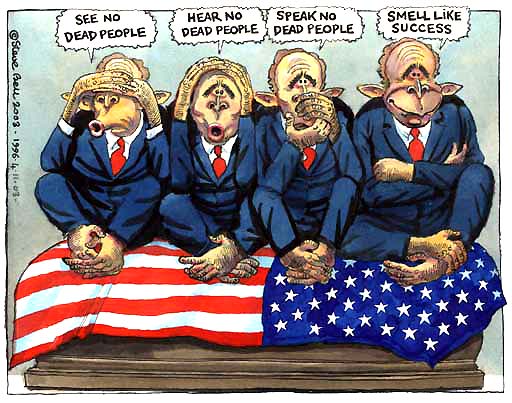
By ANDREW PURVIS / TBILISI AND JOHN WENDLE / TSKHINVALI
Wed Aug 20, 6:45 AM ET
Both Russia and Georgia have hurled charges of genocide and ethnic cleansing at each other in the aftermath of the five-day war in the Caucasus. While no substantial evidence of such atrocities has yet emerged, the toll of the fighting and the ensuing lawlessness has exacerbated ethnic animosities; once neighborly Ossets and Georgians are now implacable enemies even as they cope with life as refugees.
At the emergency hospital in Vladikavkaz, the capital of North Ossetia, every room was filled with a wounded man or old person from Tskhinvali, the capital of South Ossetia. They told stories of bombs and artillery turning their houses and courtyards into fiery traps, of perilous rescues, of the fear that they have nothing left to return to. Most have expressed confusion about why Georgia would attack and felt that they could never live with Georgians again. Those who continued to feel that their Georgian relatives, neighbors and friends were good people nevertheless believed that the Georgian leadership were stooges of America, which was bloodthirsty and corrupt. They have nicknamed the ideology of President Mikheil Saakahsvili, leader of Georgia, "Saako-fascism."
The stories are reversed in Tbilisi, capital of Georgia, where lurid posters portray Moscow's leaders Vladimir Putin and Mikhail Medvedev as Hitler and Mussolini and show a gluttonous Russia devouring Georgia and asking "Who's Next?" Givi Tadiashvili fled from a village near Tskhinvali, the capital of South Ossetia, where he said looters showed up after the bombing ended, demanding water and wine to drink. They made his neighbor drink it first, to make sure it was not poisoned. Three villages were burned in the area of his home. "They do it to show their aggression. It's their revenge not to let us go back," he says. Another man, taking shelter at an old school in Tbilisi, says that he left his sick mother behind in her home in his native village and is now worried she is going to be burned alive. He says he has heard reports since he left that the whole village has been torched: "if they burn the house she will die inside," says Tamaz Zangaladze, 55, who says he saw five friends killed in the conflict.
A South Ossetia government official speaking on condition of anonymity admitted that Ossetians had started murdering the old people who had remained to protect houses, possessions and livestock. TIME has not been able to verify that claim.The Russian military, which invaded after Georgia tried to retake the breakaway region of South Ossetia, has not allowed Western journalists to leave the buses that have been allowed through the destroyed areas. But Russian journalists have been given free access all over the area and allege that ethnic Georgian property has been targeted. Explains Dmitry Steshin, a reporter for Komsomolskaya Pravda, a Russian daily newspaper: "[The military doesn't] want you to see that all the Georgian homes have been burned down. It's as simple as that." Says Ludmilla Alexandrova, 50, a resident of Tskhinvali, "I don't think the Georgians will ever return." She will not miss them. Alexandrova has organized a water distribution point for her neighborhood - an area, like the rest of the capital without water, gas or electricity. The Georgians, she says, "caused all of our problems. They turned off our water and gas in the past."
The situation has been made worse by a second wave of violence after the Russian intervention, carried out not by soldiers but by looters, including some local Ossetian militias as well as Chechen and Cossack gangs from Russia. It has laid further waste to the region, say refugees and human rights workers. "This conflict has been a disaster for civilians," Rachel Denber, Europe and Central Asia deputy director at Human Rights Watch said in a statement on Monday. She said there was an urgent need for fact finding missions to establish the facts of the conflict and "urge authorities to account for any crimes." She added: "Russia should prevent any further militia attacks and allow humanitarian aid to reach the hundreds of vulnerable civilians still in the area, including many elderly."
Some local Ossetian officials with the breakaway government have said that the looting is justified as retribution for the Georgian attacks on Ossetian positions that provoked Russian military intervention. The breakaway territory's nominal president Eduard Kokoity, a former wrestler, when asked whether ethnic Georgians who had been living in South Ossetia would be allowed to return, told the Russian daily Kommersant that "we have no intention of letting them in there."
Several Russian officials, confronted by aid officials with the evidence of widespread looting in the occupied Georgian city of Gori, said the area is not their responsibility because it is legally Georgian territory. But human rights monitors reject that argument. "This area [now occupied by Russian troops] is effectively under Russian control. The Georgian military is not there, so Russia has a responsibility to protect civilians there," says Giorgi Gogia, a researcher for HRW in Georgia. In Tskhinvali, however, locals say that the Russian presence has helped re-establish security. "When the Russian Army came, says Misha Masurashvili, a gangly 17-year old, "the bandits ran off."
The death toll from the war and its aftermath has yet to be determined - making allegations of genocide impossible to investigate. No mass graves, for example, have yet to be discovered. Russia has said that Georgian government troops and militia had begun ethnic cleansing when they tried to retake the breakaway region; and the South Ossetian Interior minister Mikhail Minzayev has estimated 2,100 dead. (Western journalists in the area have come up with rough estimates of 500 to 600 dead.) Gogia said that the South Ossetian and Russian claims of more than one thousand dead are "inflated, exaggerated. There is no way to say a genocide take place. If there were 2,000 dead we would have 6,000 wounded and we have seen nothing like that." Meanwhile, Minzayev denied there had been acts of ethnic cleansing against Georgian villages, saying "there has not been one example this activity in South Ossetia."
Minzayev said that the army is still finding bodies in basements - sometimes just bones because of fires. An estimated 95% of the buildings in Tskhinvali have suffered fire damage as a result of war and looting. The only houses that hadn't been burned were the ones that were still under construction and didn't contain anything valuable to steal. "People are burying their dead in the courtyard of their homes and in their clan cemeteries in the mountains." Priests at the Mary Mother of God church, a South Ossetian congregation, in Tskhinvali said that they had carried out more than 100 funerals in a three day span. "But we have carried out many more than that outside of the church, in people's courtyards," one said. "When the body begins to smell, they are not allowed to have a service in the church itself." He added, "I've lost count of how many we've buried."
Et suivant l'exemple de leur belliqueux président installé à leur tête par les USA, ces soldats Géorgiens sont prêts à reprendre la guerre :
Wounded Georgian soldiers say ready to fight again
http://www.alertnet.org/thenews/newsdesk/LK489547.htm
20 Aug 2008 14:13:09 GMThttp://www.alertnet.org/thenews/newsdesk/LK489547.htm
Source: Reuters
By Gareth Jones
TBILISI, Aug 20 (Reuters) - David Malachini knows he is lucky to be alive after being held hostage for 10 days in South Ossetia. But he says he is ready to go and fight again for Georgia once his wounds have healed.
Malachini is one of 15 Georgians exchanged for five Russian servicemen on Tuesday in a prisoner swap in central Georgia.
"If we have to, we will go back and fight for our motherland again. We want our territory back," said Malachini, 26, as he lay in a hospital bed on the outskirts of the capital Tbilisi, hooked up to an intravenous drip.
Malachini was injured in the leg in the South Ossetian capital of Tskhinvali last week during heavy Russian aerial bombardment of Georgian forces.
With a dozen or so other soldiers he was taken captive. They were moved from cellar to cellar, and Malachini still does not know whether their captors were Russians or South Ossetians. He received no medical treatment and was sometimes beaten.
"They treated me badly, even though I was wounded," he said.
Malachini had been part of a Georgian operation to recapture the rebel, Moscow-backed province of South Ossetia on Aug. 7-8.
The attack triggered a huge Russian counter-offensive into Georgia, the largest such military deployment by Moscow beyond its own borders since the 1991 collapse of the Soviet Union.
Completely outnumbered and outgunned, Georgia's small, U.S.- trained and equipped army retreated, leaving Russian forces in control of swathes of its territory. Moscow says it will pull back all its forces to pre-conflict positions by Friday, after signing up to a peace plan brokered by France.
Russia says Georgia, a mountainous ex-Soviet republic of 4.5 million people, now stands no chance of recovering control of South Ossetia or of Abkhazia, a second breakaway province by the Black Sea also backed by Moscow. Many analysts back this view.
DEFIANT IN DEFEAT
But Malachini's steely defiance in the face of Georgia's military defeat is widely shared among his comrades.
"Yes we are sad that we could not recover Georgian territory, but we are soldiers and we carry out our orders," said Kocha Chachanidze, 32, from his bed in a nearby ward.
Chachanidze was shot in the back after the conflict erupted and when he regained consciousness found himself in a hospital in the southern Russian city of Vladikavkaz.
"They (the Russians) took reasonably good care of me, then I was handed back as part of the prisoner exchange," he said.
Asked if he thought Georgian President Mikheil Saakashvili had blundered in sending troops into South Ossetia, Chachanidze said he could not comment on politics, adding: "War brings good to nobody but he (Saakashvili) is our commander-in-chief."
Georgia's 28,000-strong armed forces have now withdrawn to their normal bases under the French-brokered peace plan.
At the Vaziani army base near Tbilisi, soldiers conducted a drill on the parade ground in the sultry August heat.
"We will protect our homeland," David Aslanmazishvili, 23, of the 4th infantry brigade, said proudly. But there was frustration and disappointment too in his tone.
"We came under attack from South Ossetian rebels, we beat them back easily. If ordered to take the whole of South Ossetia we could have done so. But the Russians came in with heavy aerial and artillery bombardment. There were many Russian tanks.
"The Russians were absolutely ready for this conflict, it is impossible to have staged such a massive attack without lengthy and careful preparation," he said. (Editing by Jon Boyle)
oui, l'incendie allumé par Bush & co dans le Caucase n'est pas prêt de s'éteindre. Il faut beaucoup espérer que les autres vassaux de Washington qui sont occupés à placer du bois à brûler et beaucoup d'huile un peu partout autour de la Russie n'arrivent pas à allumer ces trucs-là. Parce qu'en coulisses, il y en a "certains" qui comptent les coups et préparent leurs munitions..
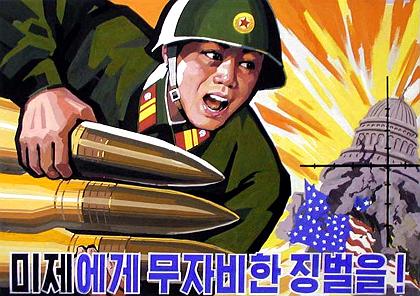

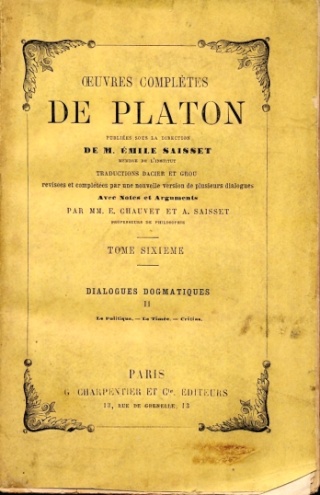


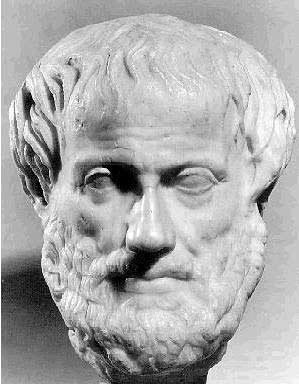
Aucun commentaire:
Enregistrer un commentaire